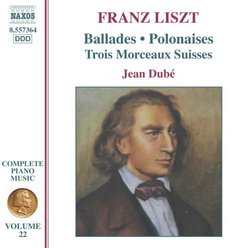| All Artists: Franz Liszt, Jean Dubé Title: Franz Liszt: Ballades; Polonaises; Trois Morceaux Suisses Members Wishing: 0 Total Copies: 0 Label: Naxos Release Date: 4/19/2005 Genre: Classical Styles: Chamber Music, Forms & Genres, Ballads, Short Forms, Suites, Historical Periods, Classical (c.1770-1830), Instruments, Keyboard Number of Discs: 1 SwapaCD Credits: 1 UPC: 747313236428 |
Search - Franz Liszt, Jean Dubé :: Franz Liszt: Ballades; Polonaises; Trois Morceaux Suisses
 | Franz Liszt, Jean Dubé Franz Liszt: Ballades; Polonaises; Trois Morceaux Suisses Genre: Classical
|
Larger Image |
CD DetailsSimilar CDs
|
CD ReviewsMusic 2 Stars; Performance 4 Stars J Scott Morrison | Middlebury VT, USA | 05/06/2005 (3 out of 5 stars) "Is there any composer whose piano music is more uneven than that of Liszt? There are some undoubted masterpieces like, say, the B Minor Sonata and parts of the 'Années des Pèlerinage,' and then there are the utterly trivial works, some of which are on this CD. The reason for this, of course, is that early Liszt tends to be superficial because at that time he was performing as a barnstorming virtuoso at a time when superficiality is what the public wanted. (Think of the tons of similar forgotten music by contemporaneous virtuosos like Thalberg and Pixis.) But then he got more serious about his compositions and things got better. Unfortunately, there is little on this CD from that more serious side of Liszt's output. Mostly what we get is tinkling and bombast. One piece here, 'Au bord d'une source,' is presented in its early form; it was later recomposed for inclusion in Second Swiss Année de Pèlerinage. The revised version is much the superior. The 'Trois morceaux suisses' played here are little more than arrangements of popular tunes. The two Ballades are generally bombastic, and although written near the time that Chopin was writing his four Ballades, they don't come close to those masterpieces. One could perhaps make a case for the 'Deux Polonaises' but again they fail in comparison to Chopin's essays in that form. So, what we're left with is some extremely nicely played trifles. The pianist is a very young Frenchman, Jean Dubé, winner of a recent Utrecht Liszt Competition, and indeed this recording (the 22nd volume in Naxos's survey of Liszt's complete piano music) is part of his prize award. He is a very talented player and one expects to hear more from him. One hopes it will be in more substantial music. The recorded sound is fine. TT=74:30 Scott Morrison" A Liszt Goody Bag Hexameron | 08/18/2006 (4 out of 5 stars) "When I was a kid, I enjoyed getting my hands on goody-bags that were passed out in various elementary-school-sponsored picnics and outdoor events. I remember the excitement of rummaging through a paper bag for miscellaneous items inside: chewing gum, stickers, cheap toys, and other novelties. Some of the items brought joy and others were quickly discarded into the trash. I think that sentiment could just as easily be made for this Volume 22 of Naxos' Complete Piano Music of Liszt. After sampling and digesting the pieces showcased here, I am thrilled to find numerous gems while at the same time having to ignore others. Still, the outlandish program and excellent debut of Jean Dube makes this recording a treat. I disagree with Scott's assessment (and dismissal) of these early Liszt pieces: they are not collectively musical junk.
The two Polonaises, for example, are not trivial or superficial at all. Humphrey Searle calls them "undeniably effective" and having heard all of Chopin's polonaises, I can place the "Polonaise melancolique in C minor" alongside them. Liszt combines terror, sadness, and beautiful Chopinesque melodies into this brooding polonaise. Dube's emotional interpretation certainly leaves nothing to be desired. This is not a Liszt masterpiece, but it is a fine piano composition and demonstrates Liszt's prolific powers. The second "Polonaise in E major" has all the typical gaiety and stylized dance rhythm of a Chopin polonaise. Interesting modulations and repetitions of the theme make it wholly attractive and indeed infectious. Liszt's polonaises do not travel through Chopin's patriotic territory and are simply pleasurable salon pieces. The Ballade No. 1 in D flat major is admittedly mediocre Liszt, but it has redeemable moments of tenderness and beauty. I think Liszt's musical narrative is not compelling like Chopin's or Brahms's, but there are appealing ideas everywhere. The second Ballade in B minor is a different species. This is one of Liszt's great piano compositions. Sacheverell Sitwell, an early Liszt biographer, says the piece is "concerned less with personal suffering [in contrast with Chopin's Ballades] than with great happenings on the epical scale, barbarian invasions, cities in flames--tragedies of public, more than private, import." But I'm a little disappointed in Dube's delivery. He plays too slow and at times without any poetry, owing to his lackluster legato touch. For a top-notch interpretation, look to Arrau; he does it justice. Nevertheless, Dube manages to occasionally inject ample feeling and passion into this 14-minute fantasy. Moments of grandiose virtuosity are abundant: menacing chromatic runs, whirling hurricanes of octaves, and dramatic chordal declamations. The B minor Ballade also soars through so many emotions: anxiety, love, tragedy, rage, and even triumph. It is a stellar, original and unjustly underrated work, but Dube's performance is unfortunately disagreeable. "Au bord d'une source" is famously known from the Annees de Pelerinage cycle, but the version performed here is from an earlier collection of pieces, the Album d'un Voyageur. Dube gives this oft-played work a decent interpretation, highlighting on the trickling figurations in the treble that suggest water. This earlier version is not as refined as the work that emerged from the Annees de Pelerinage, but it is generally docile and pleasant to listen to. The least successful pieces exhibited on this recording are the Trois morceaux suisses, three paraphrases from the Album d'un Voyageur. The pieces are lightweight, overly embellished trifles. The first piece, "Melodie de Ferdinand Huber," is unengaging and lacks catchy melodic material. Even its virtuosic swirls and florid decorations sound dull. The next piece, the "Melodie d'Ernest Knop" fares better, but only because of its nocturne-like character and unexpected interruptions of Sturm und Drang bravura. Comparable to Liszt's "Orage" from the Annees de Pelerinage, this piece is probably the best of the three paraphrases. The last, a Rondeau, has attractive music content and sustains itself with exciting tempi and dynamics. Bottom line: The two Polonaises and Ballade in B minor are exceptional and wonderful Liszt works that deserve a wider appreciation. I'm not enthusiastic about the Trois morceaux suisses, but the last two paraphrases possess sparkling charm and flare. Lisztians will surely want to lay their hands on this goody-bag, and Naxos continues an excellent series despite unearthing some mediocrities." |

 Track Listings (8) - Disc #1
Track Listings (8) - Disc #1


